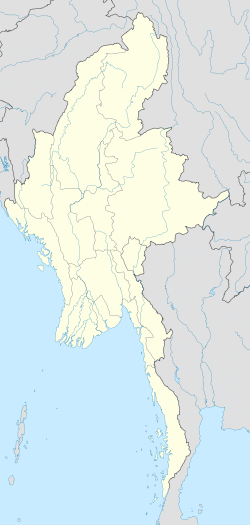
Magway Region is an administrative division in central Myanmar. It is the second largest of Myanmar's seven divisions, with an area of 44,820 km2. Pa Del Dam (ပဒဲဆည်) is one of the dams in Aunglan Township, Magway Division. The capital and second largest city of the Magway Division is Magway. The largest city is Pakokku. The major cities of Magway Division are Magway, Pakokku, Aunglan, Yenangyaung, Taungdwingyi, Chauk, Minbu, Thayet and Gangaw.
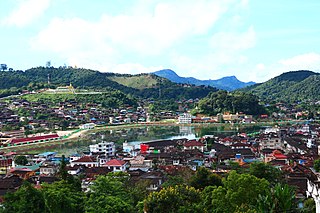
Mogok is a town of around 90,000 people in the Thabeikkyin District of Mandalay Region of Myanmar, located 200 kilometres (120 mi) north of Mandalay and 148 kilometres (92 mi) north-east of Shwebo.

Mandalay Region is an administrative division of Myanmar. It is located in the center of the country, bordering Sagaing Region and Magway Region to the west, Shan State to the east, and Bago Region and Kayin State to the south. The regional capital is Mandalay. To the south of the region lies the national capital of Naypyidaw. The division consists of eleven districts, which are subdivided into 28 townships and 2,320 wards and village-tracts.
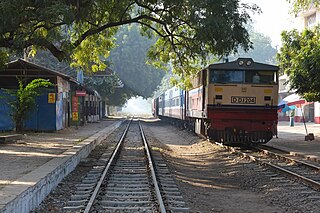
Myingyan is a city and district in the Mandalay Division of central Myanmar, previously, it was a district in the Meiktila Division of Upper Burma. It is currently the capital of Myingyan Township and lies along the National Highway 2. As of 2014, the city had a population of 276,096 and the district had 1,055,957.

Homalin or Hommalinn is a small town in north-western Burma and capital of the Homalin Township in Hkamti District of the Sagaing Region. The town lies on the Chindwin River and is served by Homalin Airport.

Pyin Oo Lwin District is a district of the Mandalay Region in central Myanmar. It lies northeast of Mandalay, and consists solely of Pyin Oo Lwin Township.

Singu is a township of Thabeikkyin District, Mandalay Division, Myanmar. The capital is Singu.

Mogok Township is a township of Thabeikkyin District in Mandalay Region, Burma (Myanmar). It is located north of the city of Mandalay and surrounds the town of Mogok.

Maungdaw is a town in Rakhine State, in the western part of Myanmar (Burma). It is the administrative seat of Maungdaw Township and Maungdaw District. Bordering Bangladesh, Maungdaw is home to one of 2 official border trade posts with Bangladesh.
Kawlin (ကောလင်းမြို့) is a town in the Sagaing Division in Myanmar. Since December 2018 it has been the administration headquarters for Kawlin District as well as Kawlin Township. As of 2019, the town had a population of 25,254, up from 21,431 in 2014. The town is further subdivided into 8 wards.

Nawnghkio Township is a township of Kyaukme District in the Shan State of eastern Myanmar. The principal town and administrative seat is Nawnghkio. The name 'Nawnghkio' was started to call after a camp near a green lake. The lake is located in the west of 'Haw Taw Monastery' of today's Nawnghkio.
Tagaung is a town in Thabeikkyin Township, Mandalay Region, Myanmar. It is situated on the east bank of the Ayeyarwady River, 127 miles north of Mandalay.
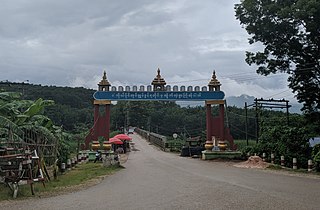
The Wa Self-Administered Division is a former De facto autonomous self-administered division in Myanmar (Burma). Its official name was announced by decree on 20 August 2010.
Gwebin is a village in Mogok Township, Pyin Oo Lwin District, in the Mandalay Region of central Burma. It is located 16 miles (26 km) west of Mogok. A track connects it to Shwenyaungbin and Mogok.

The 2012 Shwebo earthquake occurred at 07:42 local time on 11 November in Myanmar. It had a magnitude of 6.8 on the moment magnitude scale and a maximum perceived intensity of VIII (Severe) on the Mercalli intensity scale. The epicenter was near the town of Male, 52 km NNE of the city of Shwebo, 64 km west of Mogok and 120 km north of Mandalay. Significant damage and possible casualties have been reported from near the epicenter, with up to 26 people dead and many more injured. Part of a bridge under construction fell into the Irrawaddy River near Shwebo and a gold mine collapsed at Sintku. An aftershock with a magnitude of 5.8 followed at 17:24 local time.
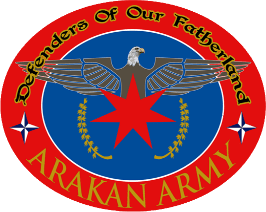
The Arakan Army, sometimes referred to as the Arakha Army, is an ethno-nationalist armed organisation based in Rakhine State (Arakan). Founded on 10 April 2009, the AA is the military wing of the United League of Arakan (ULA). It is currently led by Commander-in-Chief Major General Twan Mrat Naing and vice deputy commander-in-chief Brigadier General Nyo Twan Awng. The Arakan Army states that the objective of its armed revolution is to restore the sovereignty of the Arakan people. In a February 2024 interview, Twan Mrat Naing claimed that the AA had grown to at least 38,000 troops. Anthony Davis, an expert of military and security, rejected this claim and estimated that it has at least 15,000 troops in Chin State and Rakhine State, in addition to around 1500 in Kachin State and Shan State. In the early 2010s, the Arakan Army fought alongside the Kachin Independence Army (KIA) against the Tatmadaw in the Kachin conflict. Following the 2016 outbreak of conflict in Rakhine state, the AA became more heavily involved in the Arakan region. In 2019, the AA launched attacks on state security forces and the Myanmar Army responded, heightening clashes. The AA reached a ceasefire in late 2020 after eroding the central government's control in northern Rakhine. The power vacuum was filled by the AA over the next 18 months with state-building efforts, like their COVID-19 vaccine rollouts.
Chaoggyi Village is a village located in Thabeikkyin Township, Pyin Oo Lwin District, Mandalay Region, Myanmar.
The 1946 Sagaing earthquakes struck central Burma at 15:17 local time on 12 September. The first earthquake measured a magnitude of 7.3 Mw and was followed by a 7.7 Mw earthquake. Both events remain some of the largest in the country since the 1762 Arakan earthquake.

The Myanmar Civil War, also known as the Burmese Civil War, Burmese Spring Revolution, or People's Defensive War, is an ongoing civil war following Myanmar's long-running insurgencies, which escalated significantly in response to the 2021 military coup d'état and the subsequent violent crackdown on anti-coup protests. The exiled National Unity Government and major ethnic armed organisations repudiated the 2008 Constitution and called instead for a democratic federal state. Besides engaging this alliance, the ruling government of the State Administration Council, or SAC, also contends with other anti-SAC forces in areas under its control. Hannah Beech of The New York Times observed the insurgents are apportioned into hundreds of armed groups scattered across the country.

Thabeikkyin District is the district of Mandalay Region, Myanmar. Its principal town is Thabeikkyin.
